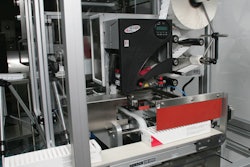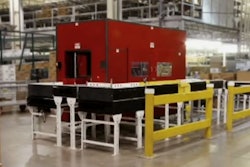Rutgers University announced in May the launch of the RFID Testing and Research Center, Piscataway, NJ. It will provide a variety of services and resources to RFID end users in the following areas:
• Validate that industry mandates and optimal reading performance are achieved
• Monitor temperature and performance of perishable supply chains such as food or pharmaceutical products
• Undertake RFID pilot trials to fulfill retailers’ requests and to comply with food safety regulations.
We interviewed Adrian Dumitru, who heads the new RFID lab, to find out more. He says the 30 x 60-ft facility is equipped with a drive-through dock-door portal, a forklift, a 44-ft-long, 600-ft/min variable-speed conveyor, and a variety of readers and antennas from multiple vendors. “We also have RFID tag-testing software in place for tag profiling and equipment to support cold-chain applications,” Dumitru notes.
A local vendor, RFID TagSource (www.rfidtagsource.com), helped Rutgers acquire the assets of the Checkpoint Systems (www.checkpointsystems.com) Supply Chain Services RFID lab. Donated equipment included the conveyor and the dock-door portal, along with readers, antennas, and software. Since then, the readers, antennas, and software have been upgraded through purchases by the Center for Innovative Ventures of Emerging Technologies (CIVET) at Rutgers.
RFID TagSource, which Dumitru describes as a key partner and lab supporter, has proposed two additional directions for the center: Tag testing for the aeronautics industry and asset tracking (inventory, control, security). Dumitru says the center’s RFID staff can train students and industry personnel in basic RFID technology, RFID tag placement, software use, and RFID system setup.
While acknowledging the belated start compared to other RFID labs and test centers (see packworld.com/webonly-23573), Dumitru notes that this center is the only university-based RFID lab in the Northeast. “Our geographical location makes us an attractive option to the many companies—in particular pharmaceutical—in this area,” he says. “Also, our capabilities go beyond supporting supply chain-focused applications to include tag performance profiling and durability testing.”
Staffing consists of one staff engineer as well as graduate and undergraduate students. Dumitru also credits Rutgers Biochemical Engineering associate professor Francois Berthiaume for his invaluable assistance in the start-up of the facility.
The facility is available for contract work, with costs based on the time required to complete the job and the specifics of the project, according to Dumitru. For further information, contact Dumitru at 732/445-4500, x 6388 or by e-mail at [email protected].

























